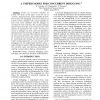Free Online Productivity Tools
i2Speak
i2Symbol
i2OCR
iTex2Img
iWeb2Print
iWeb2Shot
i2Type
iPdf2Split
iPdf2Merge
i2Bopomofo
i2Arabic
i2Style
i2Image
i2PDF
iLatex2Rtf
Sci2ools
108
click to vote
ICPP
1993
IEEE
1993
IEEE
A Unified Model for Concurrent Debugging
: Events are occurrence instances of actions. The thesis of this paper is that the use of “actions”, instead of events, greatly simplifies the problem of concurrent debugging. Occurrence instances of actions provide a debugger with a unique identifier for each event. These identifiers help the debugger in recording the event orderings. The recorded orderings indicate much more than a mere temporal order. They indicate the dependences that “cause” the actions to execute. A debugger can, then, collect the dependence information from the orderings of different instances of the same action, and deduce the conditions that govern the execution of the action. This provides a framework for representing and checking the expected behavior. Unlike existing approaches, we cover all parts of the debugging cycle. Our unified model, therefore, allows a single debugger to support different debugging facilities like execution replay, race detection, assertion/model checking, execution histo...
Debugger | Distributed And Parallel Computing | ICPP 1993 | Mere Temporal Order | Occurrence Instances |
Related Content
| Added | 08 Aug 2010 |
| Updated | 08 Aug 2010 |
| Type | Conference |
| Year | 1993 |
| Where | ICPP |
| Authors | S. I. Hyder, John Werth, James C. Browne |
Comments (0)

